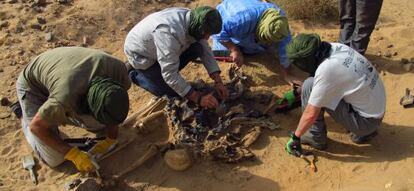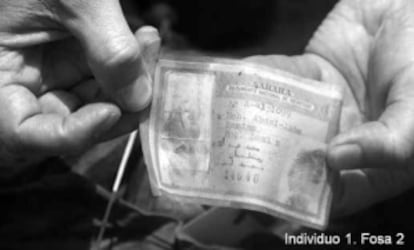Bringing atrocities to light
A team of Spanish forensics experts has identified the remains of eight Sahrawis The victims, two of whom were children, were assassinated by Moroccan soldiers in 1976


"He was wearing a blue sweater," Mahmud Salaf Dafa told the investigators. Thirty-seven years later, he clearly remembered how his 14-year-old brother was dressed the last time he saw him, on February 12, 1976. Salka Mohammed Mulud also described in great detail "the rosary with the large red and green beads" that his father had around his neck that same day, when he, too, went missing.
When a Spanish team led by forensics expert Francisco Etxeberria of the Basque Country University found and opened two mass graves last June in the Sahara desert, they found the blue sweater and the rosary beads. Among the sand and the bones, investigators also found the cartridges that the Moroccan military used to kill them after persistently asking them, to no avail: "Where are the Polisario members?"
A 13-year-old child witnessed the whole thing, and 37 years later he told the Spanish team about it. The investigators had come to the Sahara on the request of the Association of Relatives of Sahrawi Prisoners and Missing Persons (Afapredesa). "Around 8pm a jeep showed up. The man called Mohammed Mulud first, and asked him: "Where are the Polisario?"
Mohammed Mulud denied knowing anything about the insurgents fighting the Moroccan occupation of Western Sahara, after Spain relinquished control in 1975. The military man shot him in the heart, point blank. Then he called up Abdelahe Ramdan, asked him the same question, and shot him the same way. "The man had a pistol, but he used a rifle to shoot," explained Aba Ali Said Daf, who was 13 at the time.
Morocco lied when it said four of the victims had died after being detained
Etxeberria's team found the bodies on June 8. They were located in the area of Fadret Leguiaa, in the Smara region, some 400 kilometers from the Sahrawi refugee camps of Tindouf in Algeria.
In three days, the forensic experts opened two graves containing the remains of eight victims, two of them underage. Genetic testing conducted at the Basque Country University shows that two of the bodies belonged to a father and his 14-year-old son.
Aba Ali Said Daf did not see these two last executions, but he says he did hear Salma Daf Salec Bachir begging the military not to kill her child. Neither her pleas nor the boy's age moved the assassins.
The investigators also found two Spanish ID cards among the bones. They once belonged to Mohammed Abdalahe Ramdan (A-4131099) and Mulud Mohammed Lamin (A-4520032). Another skeleton still had a wallet containing a sugar ration card in the name of Salama Mohammed Ali Sidahmed.
We were happy kids until the military killed my father and kicked us out"
For decades, according to the report drawn up by Etxeberria and the psychologist Carlos Martín Beristain, of the Institute for International Development and Cooperation Studies, Morocco refused to give the families of the victims an official explanation regarding the location of their loved ones.
In 2004, King Mohammed VI created an agency called Equity and Reconciliation to shed some light on the crimes committed under the reign of his father, Hassan II, and provide compensation for the victims. In 2006 the agency came up with a victim list that included four of the people recently found in the mass graves; they were said to have been taken down to the station in Smara and to have died during detention. "Arrested by the Royal Army in June 1976 in Smara, taken to one of the bases, where she died," says the report about Salma Daf Sidi Salec.
The investigating team has proven that Morocco lied. "The arrests took place on the same day
and the detainees were not transferred anywhere, but immediately executed on the spot," reads the expert report. The genetic analysis of the bones confirms this fact.

"The lies regarding these four victims raises questions about the credibility of the entire document drafted by Morocco," says Etxeberria. "That is why we are going to Geneva, to the United Nations, to ask this body to step in. We also requested a meeting with [Spanish] Foreign Minister José Manuel García-Margallo, because the victims were Sahrawis with Spanish citizenship and we feel he should have something to say about it."
Since the graves are in an area under supervision from MINURSO (the UN mission to Western Sahara, there to ensure the 1991 ceasefire is respected), the victims' remains "were left duly protected and the spot where they were found marked, to facilitate an official verification mission that should be sent out shortly to hand over the remains to their families and implement protection measures for other graves in the same area."
Right now, adds the Spanish report, "there are over 400 Sahrawi victims of forced disappearances." The Spanish team wants to return to the same area in a couple of months, this time with international observers in tow, in order to exhume the bodies and return them to their families.
Etxeberria is a seasoned forensics expert who has opened over 100 mass graves from the Franco era in Spain; he also participated in the recent exhumation of the remains of the Chilean poet Pablo Neruda, performed autopsies on the bodies of former Chilean leader Salvador Allende and singer-songwriter Víctor Jara, and exhumed the first 17 victims of the Chilean dictatorship. And yet he has returned from the Sahara feeling very emotional.
"In that far away, inhospitable place, you find identical feelings to the ones I witnessed opening a Civil War grave in Teruel or exhuming bodies in Guatemala or Chile: it's the feeling of injustice perpetuated over time, it's the need to know what happened to their loved ones; it's the mourning that never gets closure...."
"The son of one of the victims we found in the Sahara told us, 'We were happy kids, shepherds' children. We lived in peace. We all knew one another. Until the military came, killed my father, and kicked us out. From that day on, it was nothing but tears and watching my mother lose her mind'."
Etxeberria has often heard similar stories much closer to home, in the Spanish graves where parents, children and siblings of Franco's victims have been feeling the same kind of pain as these eight Sahrawi families.
Tu suscripción se está usando en otro dispositivo
¿Quieres añadir otro usuario a tu suscripción?
Si continúas leyendo en este dispositivo, no se podrá leer en el otro.
FlechaTu suscripción se está usando en otro dispositivo y solo puedes acceder a EL PAÍS desde un dispositivo a la vez.
Si quieres compartir tu cuenta, cambia tu suscripción a la modalidad Premium, así podrás añadir otro usuario. Cada uno accederá con su propia cuenta de email, lo que os permitirá personalizar vuestra experiencia en EL PAÍS.
¿Tienes una suscripción de empresa? Accede aquí para contratar más cuentas.
En el caso de no saber quién está usando tu cuenta, te recomendamos cambiar tu contraseña aquí.
Si decides continuar compartiendo tu cuenta, este mensaje se mostrará en tu dispositivo y en el de la otra persona que está usando tu cuenta de forma indefinida, afectando a tu experiencia de lectura. Puedes consultar aquí los términos y condiciones de la suscripción digital.








































